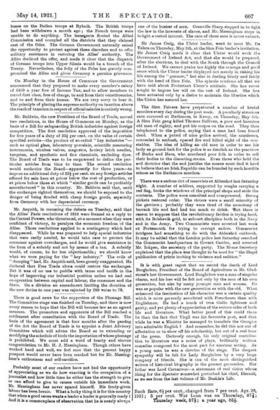Mr. Asquith, in resuming the debate on Tuesday, said that
the Allies' Paris resolutions of 1916 were framed as a reply to the Central Powers, who threatened, at a moment when they were confident of victory, to paralyse the economic freedom of the Allies. Those resolutions applied to a contingency which had disappeared. While he was prepared to help special industries that were really needed, he would take care to protect the consumer against overcharges, and he would give assistance in the form of a subsidy and not by means of a tax. A subsidy would, of course, be far less objectionable ; we should know what we were paying for the " key industry." The evils of " dumping " had, Mr. Asquith said, been grossly exaggerated. He declared that Free Trade alone could restore the exchanges. But it was of no use to peddle with taxes and tariffs in the hope of improving our industrial position unless we had real co-operation between capital and labour, the consumer and the State. On a division an amendment limiting the duration of the new duties to one year was rejected by 289 votes to 79.


































 Previous page
Previous page